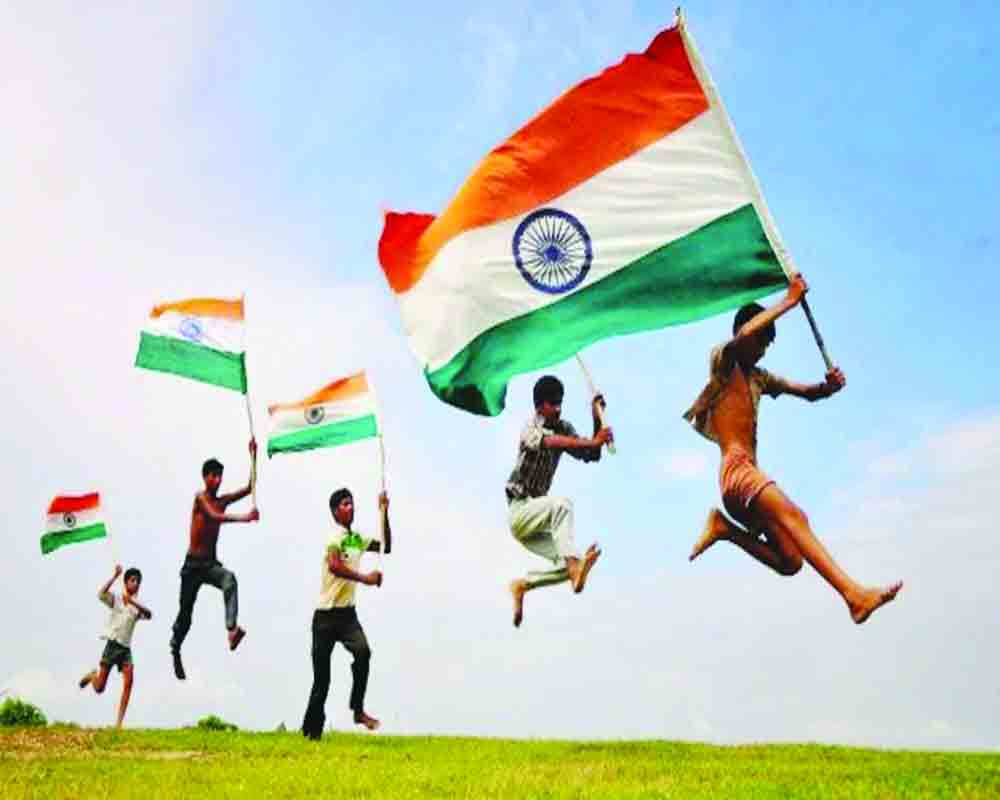Independence is commonly perceived only as emancipation from foreign rule but achievements like nation building are often underplayed
Tomorrow, India will enter 75th year of her Independence. Howsoever iniquitous had the British rule been, its termination in August 1947 was marked by absolute cordiality between the departing colonisers and the Indian people. Lord Samuel, the Liberal Peer, described the passage of the Indian Independence Bill, 1947, in British Parliament as “the peace treaty without a war”. When the last British regiment in India sailed out of Gateway of India in Mumbai (then Bombay) on February 28, 1948, they were given a ceremonial sendoff.
The surprisingly peaceful closure to British rule in India contrasted sharply with the subsequent hostile end of French colonial rule in Vietnam and Algeria and the Dutch rule over Indonesia. No doubt an orgy of violence also mauled India in 1947. It was, however, over the disorderly Partition, in contrast to an orderly transfer of power. It testified to the failure of nation building in colonial India with regard to the majority of Muslims. The Freedom Movement that had emotionally integrated the nation bypassed them. Jinnah asserted that Hindus and Muslims were two different nations with dissimilar perceptions of history. His party, the Muslim League, had pitched for Partition, accompanied by a complete exchange of population on religious lines. India’s Independence is viewed only as liberation from foreign rule. No doubt many went to the gallows, and more people to the jails, to achieve that end. However, an overemphasis on Independence tends to overshadow other achievements of the Freedom Movement. Things like growth of public discourse, emotional integration of the nation, evolution of democratic institutions — critical to the sustainment of an independent India — are often taken for granted.
Historian Stanley Lane-Poole found the history of India during the Mohammedan period more of a chronicle of kings and courts and conquests rather than of organic or national growth. Nor was there any such marked change in the principles and methods of Government as might be expected from the diversity of successive rulers of various races. Medieval India thus appeared to miss out on the political developments that were a feature of the Middle Ages in Europe. There was no equivalent of Magna Carta, model Parliament, Diet of Worms of Holy Roman Empire, establishment of universities. Even though Marathas, Rajput, Sikhs and Jats could break the Mughal hegemony, there was no corresponding development of any new thought. A 300-year delay in obtaining the printing press was alone sufficient to dis-incentivise new political and social thinking.
These changes had to wait for the 19th century when British rule had been established. India was able to access new ideas in the field of science, politics, law, economics and society in the West.
It was against this background that the national movement for self-governance began. India’s freedom struggle did not begin with the demand for freedom. It began with the demand for introduction of “elections” for enhancing Indian representation in the councils. While the resolution for Purna Swaraj (Independence) was adopted at the Lahore Congress, 1929, the demand for introducing elective elements in the councils came as early as 1885. Nomination was the method to induct Indian members in provincial and central councils under Indian Councils Act, 1861. Such persistent demand compelled the British Government to introduce elections — first indirectly in 1909 and directly in 1919. The first general elections, though on limited franchise, were held in 1920, which were boycotted by the Congress as part of the Non-Cooperation Movement. However, a breakaway section in the Congress, under CR Das and Motilal Nehru at Gaya Congress (1922), formed the Swaraj Party, which contested the elections successfully. The Swaraj Party was revived in 1934 when Congress decided to call off the Civil Disobedience Movement and participate in elections under the new constitutional arrangements that were subsequently enunciated under the Government of India Act, 1935. The Constituent Assembly represented the highest feat of deliberative democracy in British India. It led to framing of Indian Constitution without any external interference. It was the evolution of representative institutions and training in electoral and deliberative democracy that made us fit to practice democracy in India. Several newly decolonised nations in Asia and Africa ended up with dysfunctional democracy and rise of dictatorship as they lacked this training.
Another achievement of the Freedom Movement was the emotional integration of the nation. As early as at Second Congress (1886) at Calcutta, Surendranath Banerjea stated: “In ancient India, the lord of Aryavarta would summon his feudatory chiefs to his capital to celebrate the most imposing Aryan rite — Rajsuya Jagya. But those were gatherings of princes, not of peoples. Here we have before us before us personified the incarnate majesty of the nation”.
Netizens, more than ever before, question whether we got our Independence due to Gandhi’s Satyagraha? No, we did not. But he did something more important, making the aspiration for Swaraj popular, and inducting people from all walks of life in the struggle. Ceylon (now Sri Lanka) in our neighbourhood got independence in 1948 without any freedom struggle whatsoever. It, however, descended into a civil war within 30 years because no emotional integration had taken place.
(The writer is an author and independent researcher based in New Delhi. The views expressed are personal.)


























